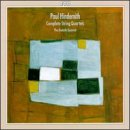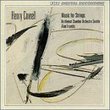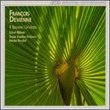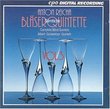| All Artists: Paul Hindemith, Danish Quartet Title: Hindemith: Complete String Quartets Members Wishing: 0 Total Copies: 0 Label: Cpo Records Release Date: 2/4/1997 Genre: Classical Styles: Chamber Music, Historical Periods, Classical (c.1770-1830) Number of Discs: 3 SwapaCD Credits: 3 UPC: 761203928729 |
Search - Paul Hindemith, Danish Quartet :: Hindemith: Complete String Quartets
 | Paul Hindemith, Danish Quartet Hindemith: Complete String Quartets Genre: Classical
|
Larger Image |
CD DetailsSimilar CDs |
CD ReviewsRecent Discovery Throws Off Conventional Numbering MARTIN SELBREDE | GEORGETOWN, TX United States | 04/19/2003 (5 out of 5 stars) "A previous reviewer correctly noted that CPO did not number these quartets in the conventional manner. That's due to the fairly recent (mid-1990s) discovery of the actual First Quartet (opus 2) by Hindemith, which had hitherto been classified as a lost work. It only makes sense to renumber them all in light of that rediscovery. One can grasp the evolution of Hindemith's style by working through the pieces in sequence (a very rewarding experience). It's hard to imagine any ensemble performing these works better than the Danish Quartet has done here -- it's no wonder that this album had won a prestigious prize in Germany. These players think as one, so synchronized are both the phrasing and dynamics. Hindemith benefits from this high level of commitment. The two earliest works just barely suggest a 20th-century aesthetic, being riveted to the extant legacy in this genre. From the 3rd quartet and beyond, these works are forward-looking. Hindemith's commitment to tonal principles is most obvious in the later works, where conservatism meshes with inventiveness and a fair share of effortless counterpoint. All in all, an outstanding buy, and a potential wellspring of surprise to those ready to write off Hindemith as a stuffy academician." An excellent introduction to one of the greatest quartet cyc E. T. H. Teague | Chester, England | 08/28/2006 (5 out of 5 stars) "The late Hans Keller regarded Hindemith as one of the few composers able to produce what he called 'intrinsic' quartets, that's to say quartets addressed in the first place to the player (the listener being, as Keller put it, "a more or less welcome eavesdropper"). This collection includes the recently re-discovered early work in C major. The performances are technically and musically excellent. As a previous reviewer has noted, there is much to be said for listening to them in the order in which they were composed, so as to follow the development of Hindemith's style over a period of three decades. The first quartet, a student work, shows the influence of Brahms and Dvorak. It overflows with attractive melody but is heavily scored, with much double-stopping and virtually no rests. As a result, it sounds in places more like a sextet than a quartet. Disappointingly, this performance omits the repeat in the first movement. By the last (7th) quartet, written in 1945, Hindemith's writing had become more economical and transparent in texture, harking back to the great quartets of Haydn. These are masterly compositions, displaying Hindemith's melodic gift in a way that will astonish anyone tempted to dismiss him as the author of forbidding 'Gebrauchsmusik'. Although they may indeed be 'intrinsic' quartets, addressed primarily to the player, they are in most cases so difficult to play that they are likely to prove well beyond amateur capabilities. Even those that Hindemith - himself a professional quartet player - regarded as relatively simple are technically fiendish. Those of us who must content ourselves with 'eavesdropping' are fortunate to be able to explore this underrated cycle of 20th century quartets through such a fine and reasonably priced collection of recordings. " Great performances of tough works Michael Suh | 05/11/2007 (4 out of 5 stars) "Musicians always say Hindemith is more fun to play than to listen to, and I think that's partially true. I think his orchestral works are generally a pleasure to play and to hear, but I think his chamber music can be a challenge to sit through without a score. Some of his string quartets aren't easy to get through -- they tend to be very academic and it's clear the man loved his fugues and counterpoint. Most of his chamber music suffers without a full orchestra to provide more color or timbral textures. They can get a little bland.
That said, the performances here truly sparkle. I can't imagine performances more committed or impassioned. The 7th String Quartet hums along as if the Danish Quartet has been playing it all their lives, and the 1st String Quartet comes off as unmistakably Hindemith even if it has traces of Dvorak in it. I'm not a fan of the 2nd String Quartet -- I think it rambles on far too long; it's hard to squeeze blood out of a turnip. I esepcially like his later quartets -- they're concise and show Hindemith at the height of his creativity. Unlike another reviewer's comment, I believe these are clearly NOT among the best string quartet cycles written in the 20th century. Those honors belong to Bartok, Shostakovich, Elliott Carter, and Schoenberg. Then one must pass by Martinu, Villa-Lobos, Milhaud, and Britten before we start reaching Hindemith's little gems. This isn't to say they're not good. ALL of those sets are worth getting to know. I just wouldn't claim Hindemith's quartets to be history-altering works when other quartets that happen to be more firmly entrenched in the repertoire are. I like the set, love the performances. It's just a shame that his string quartets aren't as strong or vibrant as his orchestral works or Kammermusik." |

 Track Listings (12) - Disc #1
Track Listings (12) - Disc #1


